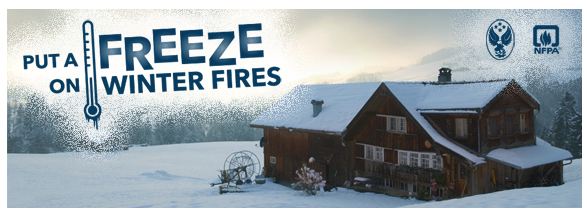While a warm home and a hot meal on a cold winter’s day may conjure up thoughts of safety and security, the unfortunate reality is that winter is the leading time of year for home fires in the United States. That’s why the National Fire Protection Association (NFPA) and the U.S. Fire Administration (USFA) have teamed up to help prevent home fires in the winter months.
According to the U.S. Fire Administration and National Fire Protection Association (NFPA there are more house fires during the winter than any other season.
Through a jointly sponsored initiative – Put a Freeze on Winter Fires – NFPA and USFA are working collaboratively to tell the public about ways to stay fire-safe this winter. The effort targets home heating and cooking, which represent the two leading causes of U.S. home fires. Both types of fires peak in the winter months.
“The use of heating equipment largely contributes to the peak in U.S. home fires during the winter months,” said Lorraine Carli, vice president of communications at the National Fire Protection Association (NFPA).
The USFA reports that nationally, on average, winter residential fires result in an estimated 945 deaths, 3,800 injuries and $1.7 billion in property damage. However, the USFA said there are simple things you can do for these next few, cold months to maintain a fire-safe home.
It said winter fires happen more often mostly because of an increase in cooking and heating fires, and winter storms that knock out power cause people to turn to alternative heating sources, raising their risk.
Winter Fire Safety
According to NFPA’s most recent report, “Home Fires Involving Heating Equipment,” home heating equipment was involved in an estimated 57,100 reported home structure fires, 490 civilian deaths, 1,530 civilian injuries, and $1.1 billion in direct property damage in 2010.
Stationary and portable space heaters accounted for one-third (32 percent) of reported home heating fires, but 80 percent of the home heating fire deaths, two-thirds (67 percent) of associated civilian injuries, and half (52 percent) of associated direct property damage.
“Space heaters clearly present the greatest risk of home heating fires,” said Carli. “No matter what type of heating system people may use, we can all reduce our risk by taking simple safety precautions.”
Below are tips for safely heating your home this winter:
* All heaters need space. Keep anything that can burn at least three feet away from heating equipment, like the furnace, fireplace, wood stove, or portable space heater.
* Have a three-foot “kid-free zone” around open fires and space heaters.
* Never use your oven to heat your home.
* Have a qualified professional install stationary space heating equipment, water heaters or central heating equipment according to the local codes and manufacturer’s instructions.
*Have heating equipment and chimneys inspected and cleaned each year by a qualified professional.
* Remember to turn portable heaters off when leaving the room or going to bed.
* Always use the right kind of fuel, specified by the manufacturer, for fuel-burning space heaters.
* Make sure the fireplace has a sturdy screen to stop sparks from flying into the room. Ashes should be cool before putting them in a metal container. Keep the container a safe distance away from your home.
*Test all smoke alarms monthly and replace the batteries once a year, or when they begin to chirp, which means the batteries are running low.
* Install carbon monoxide (CO) alarms outside each sleeping area and on every level of the home. Test the alarms monthly.
For more winter fire safety tips from the USFA: http://www.usfa.fema.gov/citizens/home_fire_prev/holiday-seasonal/winter.shtm
For additional tips from the National Fire Protection Association: http://www.nfpa.org/categoryList.asp?categoryID=2103&URL=Safety%20Information/For%20consumers/Holidays/
Checklist for safely preparing for the heating season: http://www.nfpa.org/assets/files//Public%20Education/Top10WinterFreezeTips.pdf
(The usual disclaimers: I am not a journalist; This is a blog that expresses an outlook and is not conclusive in any shape or manner.)


